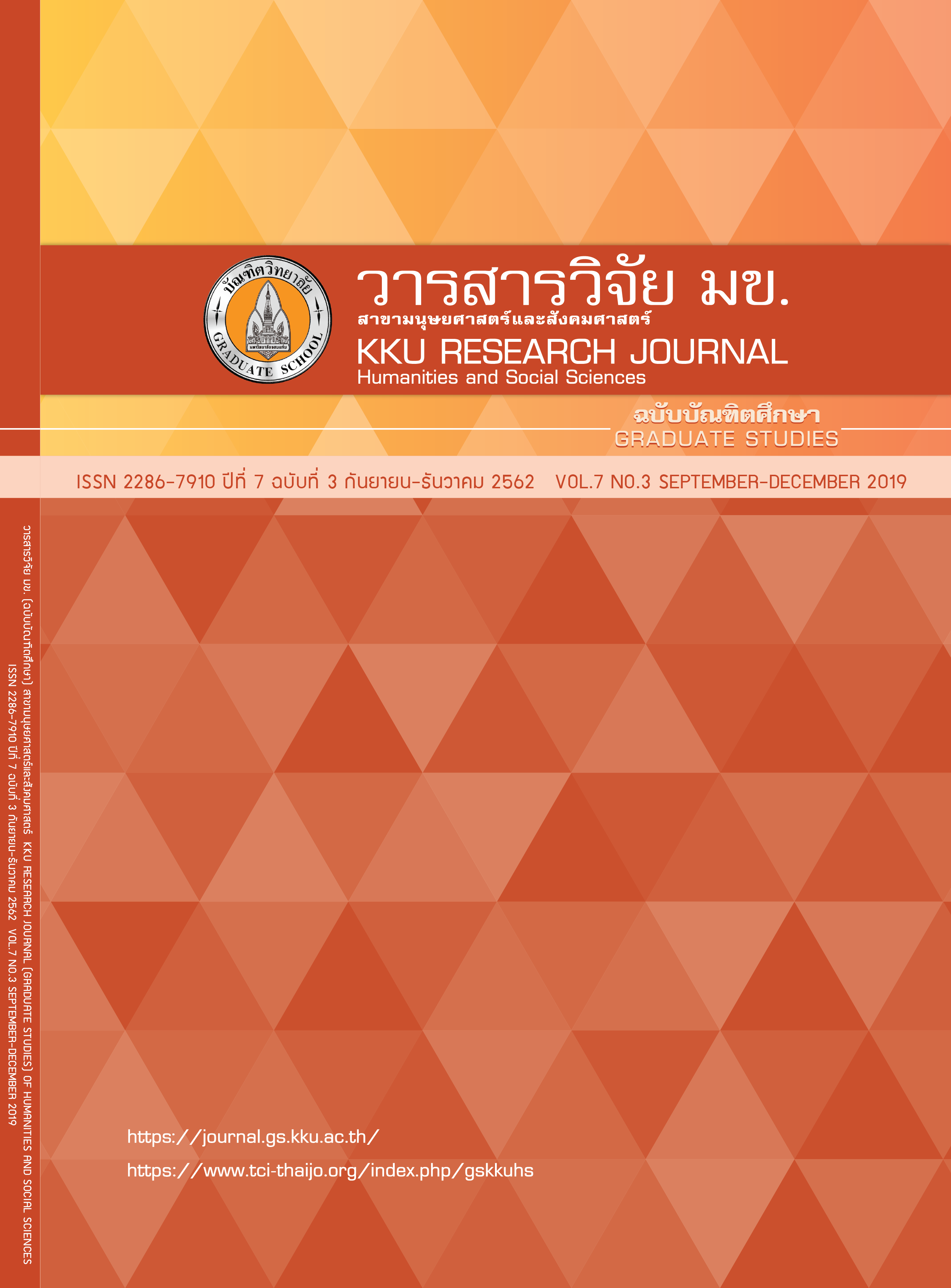บทบาทคณะกรรมการสิทธิมนุษยชนแห่งชาติในการจัดการความขัดแย้งระหว่างชาวบ้านกับโรงงานผลิตแป้งมันสำปะหลังที่ปล่อยน้ำเสียลงสู่คลองพระปรง
คำสำคัญ:
ความขัดแย้ง, การจัดการความขัดแย้ง, คณะกรรมการสิทธิมนุษยชนแห่งชาติบทคัดย่อ
การวิจัยในครั้งนี้ มีวัตถุประสงค์เพื่อสำรวจประเด็นความขัดแย้งระหว่างชาวบ้านกับโรงงานผลิตแป้งมันสำปะหลังที่ปล่อยน้ำเสียลงสู่คลองพระปรง เพื่อวิเคราะห์บทบาทและประมวลปัญหาอุปสรรคในการดำเนินงานจัดการความขัดแย้งของคณะกรรมการสิทธิมนุษยชนแห่งชาติ และเพื่อเสนอแนะแนวทางในการลดปัญหาและอุปสรรคการดำเนินงานของคณะกรรมการสิทธิมนุษยชนแห่งชาติ โดยใช้ระเบียบวิธีวิจัยเชิงคุณภาพ รวบรวมข้อมูลจากการสัมภาษณ์ การวิจัยเอกสาร และสรุปผลโดยการวิเคราะห์เชิงเนื้อหา ผลการวิจัยพบว่า ความขัดแย้งระหว่างชาวบ้านและโรงงานผลิตแป้งมันสำปะหลัง มี 4 ประเด็น ในด้านข้อมูล เกิดจากการตีความความหมายของข้อมูลที่แตกต่างกัน ด้านผลประโยชน์ เกิดจากการขาดความรับผิดชอบต่อสังคมของโรงงานอุตสาหกรรม ด้านสัมพันธภาพ เกิดจากความไม่ไว้วางใจของชาวบ้านต่อโรงงานที่สร้างมลพิษ และด้านโครงสร้าง เกิดจากระบบราชการที่มีขั้นตอนมาก โดยปัญหาด้านสัมพันธภาพถือเป็นปัญหาที่สำคัญที่สุด ในส่วนของบทบาทของคณะกรรมการสิทธิมนุษยชนแห่งชาติในการจัดการความขัดแย้ง พบว่าตามกฎหมายแล้ว คณะกรรมการสิทธิมนุษยชนแห่งชาติไม่มีหน้าที่ในการเป็นผู้จัดการความขัดแย้งได้โดยตรง แต่ได้แสดงบทบาทในลักษณะเป็นคนกลางที่รับข้อร้องเรียนจากชาวบ้าน อย่างไรก็ตาม คณะกรรมการสิทธิมนุษยชนแห่งชาติประสบปัญหาในการดำเนินงานในด้านโครงสร้างที่อยู่ภายใต้ระบบราชการที่มีจำนวนเจ้าหน้าที่ไม่เพียงพอและความเห็นที่เสนอไม่มีสภาพบังคับตามกฎหมาย จึงมีข้อเสนอแนะในการเพิ่มจำนวนเจ้าหน้าที่ให้สอดคล้องกับปริมาณงาน เน้นความร่วมมือในการทำงานร่วมกับหน่วยงานอื่น และกำหนดขั้นตอนการทำงานให้ชัดเจนเพื่อลดระยะเวลาในการดำเนินงาน นอกจากนั้น ยังเพิ่มมาตรการในการจูงใจให้หน่วยงานต่างๆ มีความตระหนักและปฏิบัติตามความเห็นและมาตรการการแก้ไขปัญหาของคณะกรรมการสิทธิมนุษยชนแห่งชาติ
เอกสารอ้างอิง
[cited 2012 Sep 4]. Available from: http://www2.haii.or.th/wiki/index.php/ Prachin Buri
river basin system .
2. Kikhuntod S. Yanree people conserve Klong Praprong [Internet]. 2012 [cited 2012 Sep 5].
Available from: http://www.codi.or.th/index.php/news/documentary-community/135-feature-
articles-and-community-self-management/2080-2012-08-29-07-40-16.
3. Saaithong T. A personal network in Praprong river basin [Internet]. 2012
[cited 2012 Sep 5]. Available from: http://www.sammachivonline.com.
index.php.
4. Office of the National Human Rights Commission of Thailand.
Petition No. 178/2550.
5. Office of the National Human Rights Commission of Thailand.
Petition No. 296/2555.
6. Wattanasup W, Tonteerawong B, Permpoonwiwat S. Managing Conflict in
health care settings. Bangkok: Saladang; 2004. Thai.
7. Sinlapasart M. Conflict Management and Mediation: general knowledge
about mediation (2nd Edition) Bangkok. Tanapress; 2007. Thai.
8. Wattanasup W, Bureekul Tand Permpoonwiwat S. A source book, empowering
dispute management processes. Samut Prakan: Printting Hall Co., Ltd.; 2002. Thai.
9. Wattanasup W, Bureekul Tand Permpoonwiwat S. A source book, empowering dispute
management processes. Samut Prakan: Printting Hall Co., Ltd.; 2002. Thai.
10. Office of the National Human Rights Commission of Thailand. Compliance with
declaration on International Human Rights. 1st edition. Bangkok; 2012. Thai.
11. Horayangkool P, Chaiyakup J, Supasakulchai A, Office of the National Human Rights
Commission of Thailand. Guiding Principles on Business and Human Rights: Implementing
the United Nations “Protect, Respect and Remedy” Framework. Bangkok: Classic scan
Co., Ltd.; 2014. Thai.




